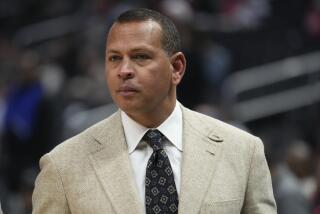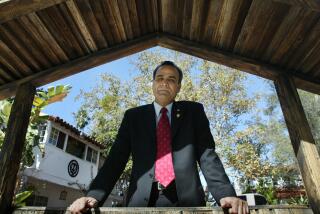Conte Is Linked to Stories Using Grand Jury Leaks
- Share via
Victor Conte, the founder of the Bay Area Laboratory Co-Operative who served prison time on a steroid dealing conviction, has been identified as a source the San Francisco Chronicle used to report on the scandal, which included stories detailing the grand jury testimony of Barry Bonds and Jason Giambi.
Conte’s e-mail conversations with Chronicle reporter Mark Fainaru-Wada were accidentally made public when blacked-out portions of an online court filing were revealed when copied into a word-processing program.
The 51-page court filing was the U.S. attorney’s reply to a motion by Fainaru-Wada and colleague Lance Williams to quash subpoenas they received in May that sought their sources in acquiring grand jury testimony quoted verbatim in the paper.
If Conte shared any grand jury information with a reporter, he would be subject to a criminal contempt of court charge. Conte signed a protective-order agreement promising not to make public any details of grand jury hearings, prosecutors said. Prosecutors in the case say they probably will pursue a criminal case against anyone who violated the protective order, in an effort to preserve the integrity of the closed grand jury system.
In e-mails, Conte told Fainaru-Wada that New York Yankees slugger Giambi told the grand jury of his steroid use. The two also discussed the testimony in early June 2004 of Olympic sprinter Marion Jones’ ex-husband, Olympic shot-putter C.J. Hunter, with Conte writing that Hunter “gave up EVERYTHING ... grand jury testimony has come back to bite her [Jones’] butt big time.”
Later that month, Conte wrote to Fainaru-Wada that, “the only way the athletes’ grand jury testimonies will come out is at trial. Unless I give you a copy of the indexed CD-rom that contains all 30 thousand pages of evidence. How would you like that? Just kidding.”
The reporter responded “immediately,” according to prosecutors in the U.S. attorney’s office, writing, “OK, why not, you talked me into it.” Two days later, on June 20, Fainaru-Wada wrote Conte, “I’m still waiting for that CD-rom. Perhaps it will arrive tomorrow. Or the next day. Or the next ... “
On June 24, the Chronicle published two stories by Fainaru-Wada and Williams that included verbatim portions of grand jury testimony by Olympic sprinter Tim Montgomery, who acknowledged Conte gave him weekly doses of human growth hormone and a steroid known as “the clear.”
“I feel very confident Victor did not leak grand jury testimony,” Mary McNamara, Conte’s attorney, said by telephone Thursday from her San Francisco office. “This is the government’s bid to get the reporters’ testimony; they have the e-mails as a factual backdrop. But this has painted Victor in the public eye as a target, and I don’t think that’s fair.”
U.S. attorney’s office spokesman Thom Mrozek in Los Angeles said Thursday the accidental release of the court filing “was not as secure as it should have been. Redacted material evidently became available as a result of conversion of the Department’s electronic submission beyond the form in which it was filed. It is an unfortunate error, one that we regret.”
Chronicle Editor Phil Bronstein declined to acknowledge if Conte leaked the grand jury testimony to the paper.
In December 2004, the Chronicle published stories detailing the grand jury statements of Bonds, Giambi and Gary Sheffield of the Yankees, with the reporters confirming that they had reviewed transcripts of the grand jury proceedings.
In January 2005, Conte’s home was raided, and the e-mail conversations were secured by the government. McNamara said that if the reporters were forced to divulge their source(s), “that’d be a good thing, it would show Victor did not leak this.”
*
The Associated Press contributed to this report.
More to Read
Go beyond the scoreboard
Get the latest on L.A.'s teams in the daily Sports Report newsletter.
You may occasionally receive promotional content from the Los Angeles Times.











